In a striking shift in behavior among wealthy Americans, a considerable segment is contemplating leaving the United States as the national political landscape becomes progressively unsettling. The upcoming election serves as a catalyst for this contemplation, with many affluent citizens expressing apprehension about potential social and political turbulence, regardless of the election’s outcome. According to immigration specialists and advisors to high-net-worth families, there has been a notable increase in demand for dual citizenship and long-term residency options in foreign countries, marking an unprecedented period in migration trends among America’s elite.
Reports indicate that immigration professionals are witnessing a dramatic rise in inquiries from clients seeking second passports or residency solutions abroad. Dominic Volek, head of private clients at Henley & Partners, notes that 20% of the company’s clientele now comprises Americans, surpassing other nationalities for the first time in history. This surge reflects a staggering 30% year-over-year increase in the number of Americans considering relocation. Similarly, David Lesperance, a managing partner at Lesperance and Associates, reports that inquiries for overseas migration have tripled in the past year alone. Such movements point to a profound shift in priorities for these individuals, who are seeking security in an increasingly volatile world.
Interestingly, the current enthusiasm for overseas residency can be traced back to a variety of motivations. Although political events are fanning the flames of migration desires, there are also nonpolitical factors at play. Affluent individuals are increasingly opting for milder climates, lower living costs, and to reconnect with families residing abroad. The desire to diversify personal risk—akin to strategies employed in financial investments—plays a significant role as wealthy Americans now construct “passport portfolios.” This concept reflects a pragmatic approach to mitigating potential threats associated with having citizenship in any single nation, especially as geopolitical tensions rise.
Furthermore, the current political climate, punctuated by fears of instability, social unrest, and escalating violence, has intensified the urgency to secure alternative residency options. Many affluent Americans reportedly cite their dissatisfaction with the political direction of the country as a primary reason for seeking new horizons. For instance, there are concerns about the aftermath of the elections, particularly revolving around figures like Donald Trump and potential policies proposed by Vice President Kamala Harris, including adjustments to capital gains taxes aimed at ultra-wealthy individuals.
When considering international locations for relocation, Europe appears to be the favored destination for many American high-net-worth individuals. Popular countries for those seeking residence or citizenship include Portugal, Greece, Spain, and Malta. Portugal’s Golden Visa program continues to attract attention, although growing property prices in regions like Algarve have prompted changes to investment requirements, rendering it less accessible than before. In Italy, recent tax adjustments have challenged its attractiveness, as the nation doubles taxation on foreign income for wealthy migrants, impacting the feasibility of residency plans.
In contrast, Malta remains a coveted location, offering a streamlined investment citizenship program that allows unrestricted access to the European Union for around $1 million. Despite legal challenges concerning this program, many experts are optimistic about its sustainability in the face of EU scrutiny.
In addition to European options, the Caribbean is emerging as an appealing avenue for obtaining second passports, especially for those looking for more straightforward pathways. Nations like Antigua and Barbuda and St. Lucia offer investment-based citizenship programs, granting entry to a broad range of countries, all of which adds to their desirability.
While the interest in obtaining citizenship or residency has surged, the practicalities of the application process pose obstacles. A multitude of applications inundating both immigration offices and legal counsel means that prospective expatriates should prepare for extended waiting periods—spanning months or even years in some cases. A combination of thorough background checks and comprehensive documentation requirements further complicates this undertaking.
As the election approaches, many feel this tide of migration could intensify, as the perception of political instability rises. The implications of these migrations are profound, reflecting not just individual choices but a broader commentary on the evolving sociopolitical landscape within the United States. American wealth is, thus, navigating uncharted waters, as affluent families grapple with the considerable decision of where to establish their next home in an increasingly unpredictable world.

